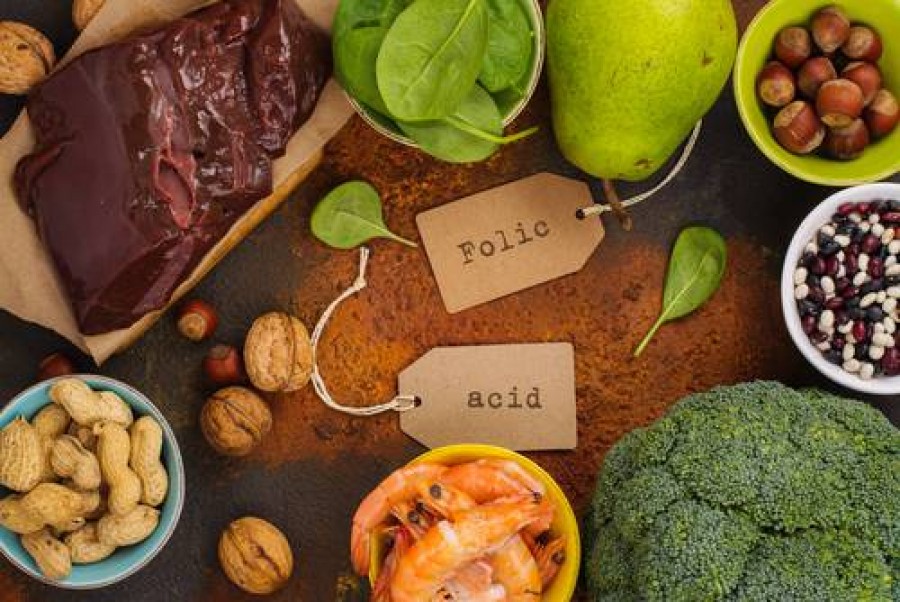Folic Acid and Pregnancy

During pregnancy, one of the biggest concerns is doing everything possible to ensure that the pregnancy goes smoothly and that the baby develops properly and is healthy. The best way to ensure a healthy baby is to make sure that you yourself are healthy. To ensure your baby develops properly and is healthy, a good and healthy pregnancy diet is crucial. Sometimes supplementing that healthy pregnancy diet with certain things like vitamins is also a good idea just to help make sure that the mum-to-be is getting everything she needs in order to provide her bub with everything they need for proper development. One thing that is completely vital to make sure that the baby develops properly is folic acid.
What Exactly is Folic Acid?
Folic acid, also known as folate depending on the source, is a very important vitamin that all pregnant women should be getting adequate amounts of in order to ensure proper development and a healthy pregnancy and baby. Folic acid and folate are extremely important to proper development. They are B group vitamins and are water-soluble. Folic acid is particularly important to proper development of the nervous system and plays a crucial role in preventing neural tube defects in the growing baby.
Folate or Folic Acid?
Folate and folic acid are basically the same thing. They are both water-soluble group B vitamins. They work the same way in the body. The difference between the two is that folate is naturally occurring in different foods that you eat, and folic acid is what is added to certain foods or used in dietary supplements.
When to Take Folic Acid?
Folic acid or folate plays a crucial role in the very early development of the baby. It specifically helps to ensure healthy and proper development of the neural tube in the first few weeks of pregnancy. The neural tube later becomes the baby’s spinal cord and brain as well as the bones that encase them. Most of the time, a woman won’t become aware that she is even pregnant until after this very important development of the neural tube. Since folic acid is most important in early pregnancy before a woman is even aware of her pregnancy, it’s a good idea for all sexually active women of child bearing age to take a folic acid supplement. This is especially true since about half of all pregnancies in Australia are unplanned.
How Much Folic Acid is Needed?
The amount of folate that women should usually get in their diet is about 400 micrograms each day. During pregnancy, that increases to 600 micrograms each day. Even if the woman is getting adequate amounts of folate in her diet, it is still recommended that women trying to conceive as well as women that are in their first trimester of pregnancy should take a folic acid supplement of at least half a milligram each day.
Women at High Risk of Having a Baby with a Neural Tube Defect
In some cases, an even higher dose of folic acid is recommended in pregnancy and prior to conception. If a woman or her partner have previously had a baby with a neural tube defect, have a neural tube defect themselves, or have a relative with a neural tube defect, the woman may need to take a higher dose of folic acid. Usually if the woman is considered high risk for having a child with a neural tube defect, it would be recommended to take 5 milligrams of folic acid each day. Other reasons for taking this higher dose of folic acid is if you have diabetes or are taking any medications for seizures or epilepsy. In any case, you should discuss how much folic acid you should be taking daily with your pregnancy health care provider.
Sources of Folate and Folic Acid in Pregnancy
Folate occurs naturally in different foods that we eat. The synthetic version of folate, folic acid, is added to certain foods, and can also be taken as a supplement.
1. Naturally Occurring Folate
There are plenty of natural ways to add folate in your diet. Folate can be found in many places. Green and leafy vegetables are high in folate, as well as fruits and legumes. The amount of folate in foods is affected by the process of cooking the foods. For this reason, the most ideal way to get folate naturally is from raw foods such as raw vegetables. Specific sources of naturally occurring folate are:
- Broccoli
- Lettuce
- Green Beans
- Cabbage
- Brussel Sprouts
- Parsnip
- Cauliflower
- Grapefruit
- Oranges
- Bananas
- Lima Beans
- Lentils
- Chickpeas
- Nuts
- Eggs
2. Foods Fortified with Folic Acid
Some foods that usually would not contain any folate, have folic acid added to them and are known to be fortified with folic acid. In 2009, it was made so that all flour used to make bread in Australia, other than flour used to make organic bread, must contain added folic acid. This was done as an effort to prevent more neural tube defects. For this reason, all bread, other than organic bread, in Australia contains added folic acid. Other foods that may be fortified with folic acid include fruit juice and breakfast cereal.
3. Folic Acid Supplement
During your pregnancy, it is a great idea to get folate and folic acid from the foods that you eat. However, due to the way that the vitamin can be destroyed during cooking, it can be very difficult to measure exactly how much of it you are getting in your diet. Due to the difficulty to keep track of folate intake from food, it is strongly recommended that women take a daily folic acid supplement to ensure that they are getting enough folic acid.
Risks Associated with a Lack of Folic Acid in Pregnancy
Getting an adequate amount of folic acid or folate during your pregnancy is of the upmost importance. If you aren’t getting enough of it, especially in those first few weeks of pregnancy, your child could end up with a neural tube defect. Neural tube defects affect approximately 1 in every 1000 babies in Australia.
Spina Bifida
Spina bifida is the most common neural tube defect and occurs when the spinal cord doesn’t close properly. Severity varies greatly but spina bifida usually causes some sensory problems, can affect motor skills, can cause problems with bowel and bladder control, and can cause paralysis. There is no cure for spina bifida, but it can be managed and some treatments are available, often including surgical options.
Anencephaly
Anencephaly is a condition where the neural tube does not close as it should at the baby’s head. This usually causes part of the brain or skull to be missing. Unfortunately, babies that have this condition typically pass away during or very soon after being born.
Encephalocele
Less common than other neural tube defects is encephalocele. This condition occurs when part of the brain and/or part of the membrane that surrounds the brain get pushed through an opening in the baby’s skull. Most of the time, this neural tube defect is treatable with surgery.
Be Prepared
Neural tube defects are very serious, but most neural tube defects can be prevented. Every woman of child bearing age should take a daily supplement of folic acid to ensure that if she does fall pregnant, that the baby has the folic acid he/she needs so desperately in those very early stages of development. Even if you aren’t planning on having a baby right now, you should still take the supplement. Many pregnancies are unplanned, and folic acid is good for you even if you aren’t having a baby. It’s super easy to take the supplement and it isn’t risky at all, so be prepared for the possibility of an unplanned pregnancy by always getting enough folate and folic acid.



